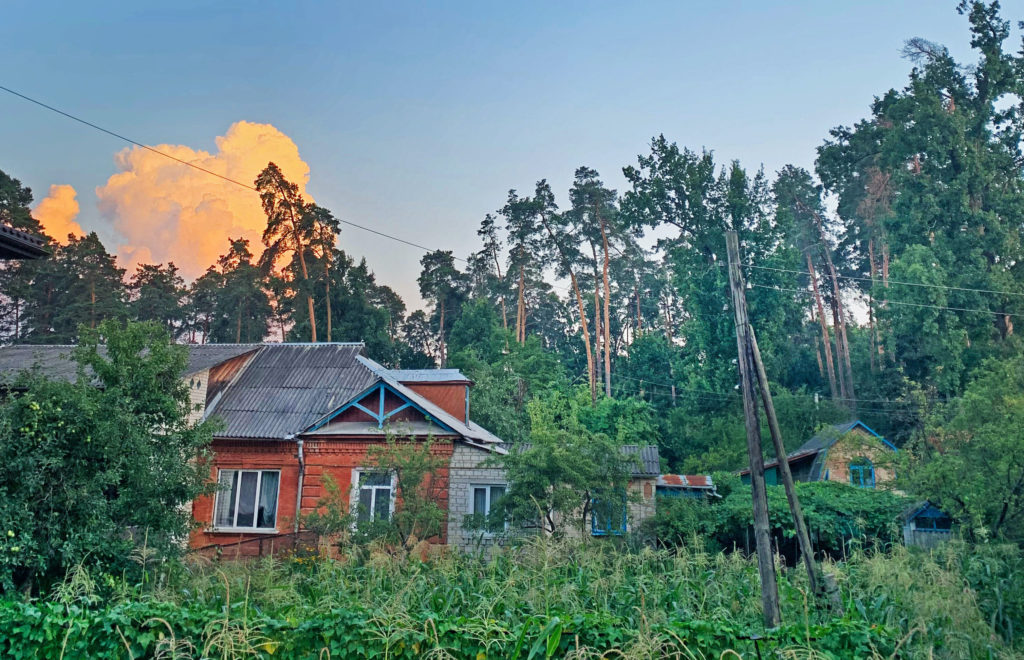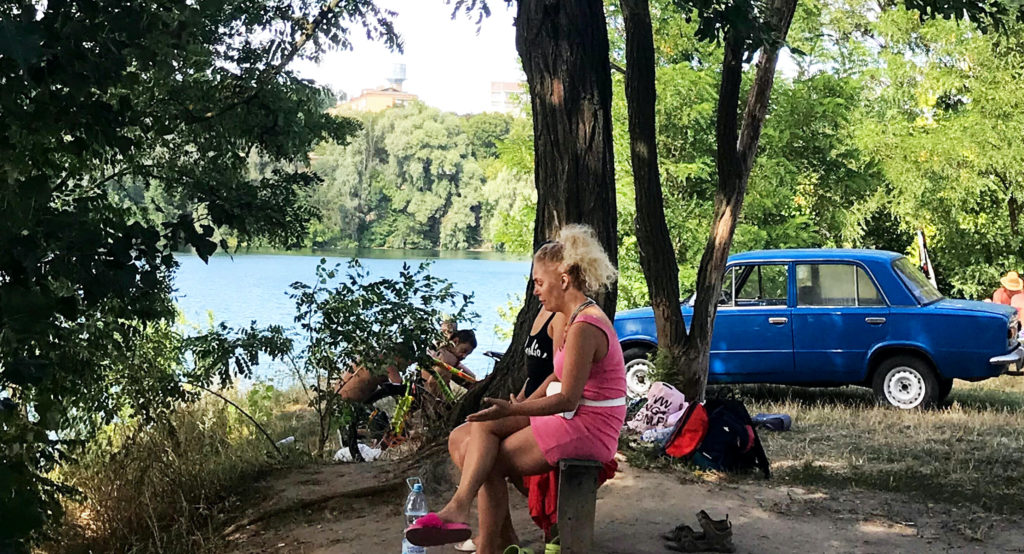Until a few weeks ago, Bucha was a leafy, comfortable commuter town. It was even nicknamed ‘little Switzerland’ in reference to its affluence and cleanliness. Half of the town stands in the pine forests — the big, well-kept homes of the wealthy dappled in the sunlight by the tall dark needled trees. It wasn’t always that way: when Ukraine gained its independence in 1991 after the collapse of the USSR, Bucha was a relatively unknown village. Its modest claims to fame were that the writer Mikhail Bulgakov (author of The Master and Margarita) had a summer cottage here and that the railway station is a heritage protected landmark from the 19th century.
It was around the 1990s that my family also moved from the capital into the village. My mum remembers the sinking despair with which she surveyed the dirt track roads and run-down homes. But little by little, as Ukraine began to regain its confidence and investment filtered through, Bucha began to grow and develop. It was always slightly ahead of its time: the statue of Lenin that stood in the dusty town square was knocked down around the new millennium, fourteen years before the wave of decommunisation swept the country after the revolution. In an absurd twist, my aunt remembers Lenin’s metal head appearing in the garden, lying among the vegetables for some time, before disappearing without trace.
As the years went on, Bucha started to look more and more like a typical European town. Gone were the grey relics of Russian influence. Essential services like the hospital and library were given new life, and Bucha was soon voted the best town to live in all of Ukraine. My aunt told me that she would often go for evening strolls after dark and never felt unsafe: the town was full of young professionals, journalists, and musicians, and their conversations would drift from out of open windows.
The last few months before the war saw a flurry of activity in Bucha. In the autumn of 2021, a centre was opened to help people who wanted to start their own small businesses. Government officials were present at its opening and famous entrepreneurs shared their advice with the audience. In January 2022, a new shopping mall was opened with big technological brands setting up stores inside, making a mark on what just thirty years before had been a forgotten village in the middle of nowhere.
A few weeks ago, that progress stopped.
The newly opened shopping mall was destroyed by the shelling of the Russians. Computers, projectors, and electronic equipment were hauled out of the schools and medical clinics, and loaded into the backs of Russian trucks. The newly painted playgrounds were crippled and littered with mines, barely visible under the sand. The shops were blown open, luxury apartment blocks blackened, smooth roads mangled with craters. The metal in the town curled in the heat of the fires.

And those who had lived in that town for those short decades of prosperity, who had found work there, who had celebrated birthdays in the restaurants off the town square, those children who had enjoyed art classes, football camps, and acted in plays with their friends: many of them have now been murdered, tortured, raped, shot. Their homes have been looted, with everything from used lingerie to sofas stolen by the retreating horde. To complete the humiliation, reports have emerged of Russian soldiers graffitiing the infamous ‘Z’ symbol and slogans like, ‘Ukrainians, suck on us down here’ and ‘Russia is great’ on the walls of private homes and public centres.

 Main Edition
Main Edition US
US FR
FR







Join the discussion
Join like minded readers that support our journalism by becoming a paid subscriber
To join the discussion in the comments, become a paid subscriber.
Join like minded readers that support our journalism, read unlimited articles and enjoy other subscriber-only benefits.
SubscribeAn absolute tragedy for you all. My heart goes out to you.
Good times will come again. I wish you all the best!
Such a heart-rending tale. As I was reading, I began to wonder, why Bucha? Why did Putin’s dark vision come to materialize in such an idyllic setting? And I had already vaguely suspected the “why” when the answer came: “Perhaps, when they saw what was good in my country, they felt jealousy and hatred. Not only had Ukrainians rejected them, but we had done well out of our independence.“ Resentment and envy are quite possibly the most potent underlying human emotions that provoke dramatic and often tragic social consequences.
That was my exact thinking too. Venom born of jealousy and illiterate hate. Dear Julia I wish only good things and a bright future for you, your family and your people. And as I have a good Ukrainian friend (who fortunately managed to escape to safety) I hope that I will be one of many, many thousands who come to visit your country and contribute in a small way to rebuilding it better than ever.
Vile contribution.
Too soon?
We can only pray that Bucha and the whole Ukraine will rise like the Phoenix in time. Meanwhile, I hope NATO will quickly realise that Putin’s war is a direct threat to the whole of Europe and to NATO itself. The Russian military and elites will only rid their country of the monster that is Putin when they see NATO taking direct action. Yes, it’s a risk, but indirect support for Ukraine will only allow Putin to continue; that is a far, far greater risk.
Was Lenin replaced by Bandera? If he was at least Bandera killed considerably fewer people than Lenin. And how many statues of Lenin still stand in Russia?
It’s a sad thing to have one’s home ripped apart.
perchance a serb ?, hope not..
There are supposed to be 10 comments (11 now with this one), but I can only see 6. Furthermore, I’ve written a comment a couple of days ago that was considered ‘vile’ by someone who replied to it. I can’t see either comment. Does that mean my ‘vile’ comment was deleted?
I don’t mind if it is, but I’d just like to be notified of its deletion, so I can adjust my comments accordingly.
I’m really sorry for what happened in Bucha, but I don’t agree with the mass formed opinion that it is solely due to Russia.US foreign policy and Ukrainian extreme nationalism play an equally large part. If that means my comments get deleted without notice, so be it.
Neven, I don’t think that the US or Ukrainian nationalists did any of the things in Bucharest that area described in the article.
Sorry autocorrect at it again. Bucha not Bucharest
First of all, nobody knows what happened exactly in Bucha with regards to the atrocities, even if the mainstream media passed judgment before any investigation was done.
Of course, the damage was caused by the fighting, but what caused the fighting? Putin/Russia, and that’s it? Or did the US and Ukrainian extreme nationalists played a part in that by making sure that the conflict would happen?
When I say this, and my comment is immediately branded as ‘vile’ and then disappeared without notice, I’m not sure how that furthers understanding of historical and nuanced context.
I guess the only thing one is allowed to say, is: Something terrible happened, so let’s send more weapons and increase sanctions, so that more terrible things are bound to happen that we can then condemn on Twitter (and Unherd).
It has now been proved, incontestably, through satellite imagery, that the Bucha crimes were committed by Russia. Perhaps Neven has evidence to the contrary?
Something terrible happened, so let’s send more weapons and increase sanctions, so that more terrible things are bound to happen that we can then condemn on Twitter (and Unherd).
So what do you propose?